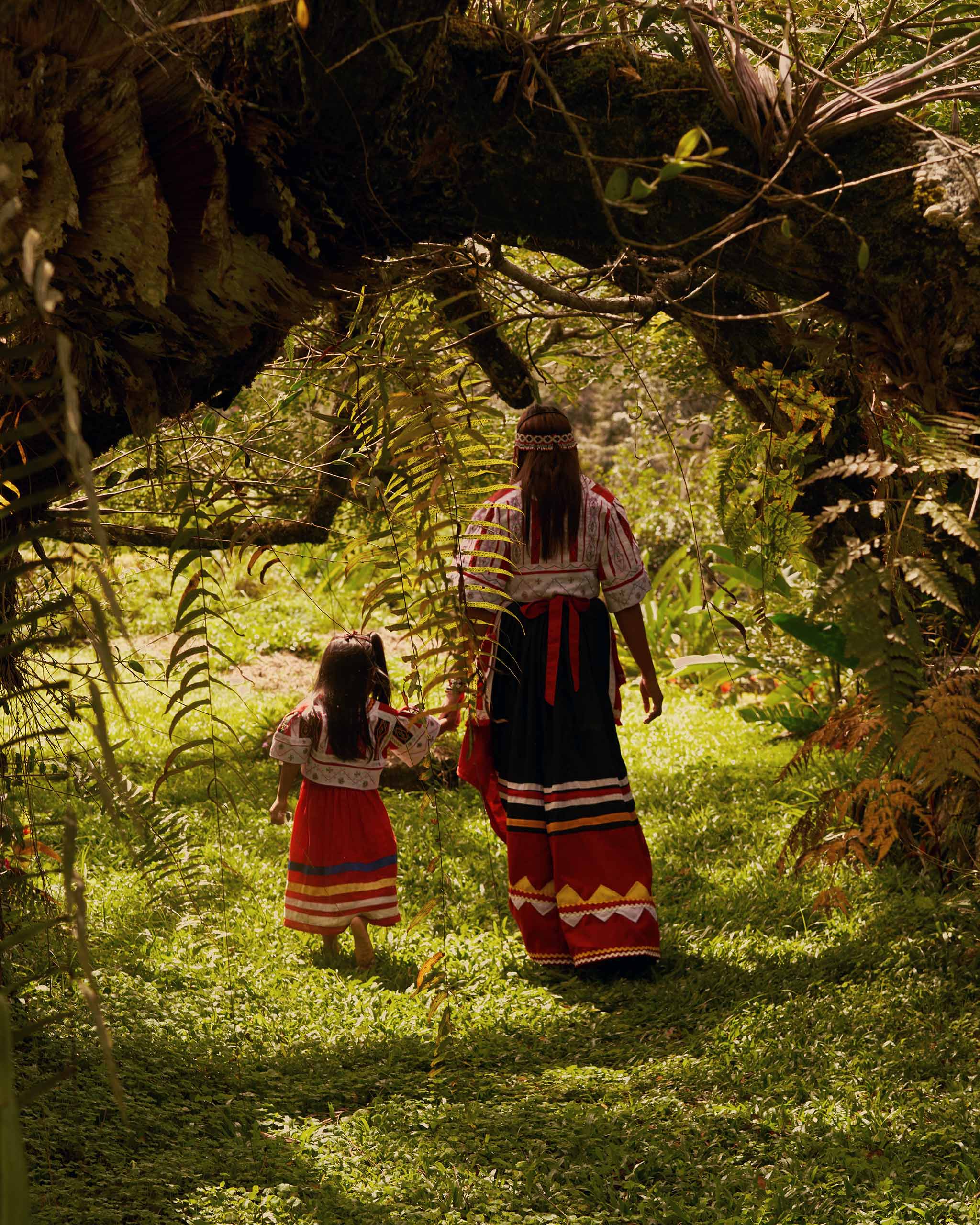Photographed by Artu Nepomuceno for the May 2024 Issue of Vogue Philippines.
On Mother’s Day 2024, Vogue Philippines celebrates with personal anecdotes from our collaborators about their experiences with motherhood.
Here, writer and editor Trina Epilepsia Boutain shares her perspective on raising children with shared heritage, and all the complexities that come with it.
“Where are you from?” the little girl asked my then-five year old daughter at the playground trampoline. There was a pause.
“From there!” Anita replied mid jump, gesturing toward the street where we lived.
The other girl looked confusedly at my husband, who had been conversing with our daughter in French. He laughed and explained that while our daughter was half French and that he was from France, she did in fact live two streets away.
“Just say you’re Filipino-French next time,” I told her.
“But mom,” my daughter complained. “Where am I from?”
In the end we decided on the Philippines, as it’s where she was born and where she currently resides. When I recall the anecdote to other people, I often wonder which needs to change—the answer or the question.
When our daughter was born, we were deluged with advice on how to raise a bilingual kid. Trilingual, I corrected them. She would learn English, French, and Tagalog. Better, in fact, if I could throw in my parents’ Ilonggo. Once, I was asked why we needed a Filipino as she wouldn’t “use it anywhere.” I was supposed to be aghast, but I also understood what they were really asking. My daughter will not need to speak Filipino to attend school here. She will also not need it to get work. Practically speaking, she was better off honing her English and French skills.
But why make her miss out on the cheeky entendres of an Eraserheads song? The heartbreak sung by Up Dharma Down? Or face the music when a specific and well placed Ilonggo expletive is (ultimately) used?
When our first child was born, my husband and I ran through a list of things to help ensure that both cultures would be shared. I was particularly eager, spurred no doubt by questions like the ones concerning language.
It’s been six years since, and so far it’s been easy. I suppose I can consider myself lucky—privileged in fact—that both of our families have been very supportive.
Whenever we are in France to visit their grandparents, my 70-year-old mother-in-law whips out the rice cooker. She’s had one for several years, starting with the first set of half-Filipino grandkids who asked for rice s’il vous plaît alongside their frites. There’s rice for the pot-au-feu dinner and the morning silog. Sometimes, there’s even SPAM. And hotdogs.
My in-laws were skeptical but accepted the idea that we co-sleep with our kids; they agree it’s better to wash their behinds with soap and water; they laugh at their “beautiful eyes” and “close-open.”
We raise the kids secularly, but in school application forms I ticked off Catholic—a request from my husband. It made sense to me to have them learn the basics of a religion whose traditions were integral to the culture. Also, I was alarmed when our daughter referred to angels as “kid birds” and asked me who Jaden was and why did the shepherds have to find him every Christmas.
I suppose this desire to infuse their childhood with as many Filipino traditions, even if superficial ones, was due to my own childhood, where much of it was ignored. I don’t blame my parents for urging us to consume only American and European (English) books, shows, and songs. Coming from middle class backgrounds, they only wanted for us to have a better shot at a better life, and this was one such way. It certainly wasn’t easy to send all four kids to private school, but my father was adamant that we did, weathering all our silly requests and disappointment when we couldn’t get the designer clothes and the fancy gadgets that the other kids got.
Proficiency in the language and familiarity with the culture made us feel more intelligent and confident. I recall one instance when my father was showing around a visiting American colleague, and she was impressed with how “American” I sounded and that I knew many of the same things her kids were into. Looking back, I realize now that all of that probably didn’t really matter—but the boost of confidence and the acceptance did.
I gradually lost that accent. As did the kolehiyala one I picked up from private school.
By the time I hit university, I still couldn’t speak Tagalog and I didn’t care. Thankfully, that slowly started to change. One of the catalysts was a Filipino-American roommate. We became friends and I was enchanted by her: she was incredibly smart, artistically gifted, and curious. She was intent on learning Tagalog and by osmosis, I learned, too. Through the years, we picked up the language, and along with it, a good chunk of the local culture. I recall nursing a heartbreak and listening to Surgarfree’s “Kuarto” while drinking San Miguel beer. Somehow the song hit more than Leonard Cohen did.
Yes, it’s embarrassing and ridiculous that it took another person—technically a foreigner—for me to rediscover and appreciate my own country and culture. But that’s how it went. And I wasn’t alone. There were, apparently, not a few of us culturally ignorant kids.
As they grow older, my kids will have to deal with their shared heritage and all the evolving complexities that come with it. I am hoping I will be able to help equip them to treat each with care, respect, and understanding.
Where are they from? I suppose only they can say for sure.
